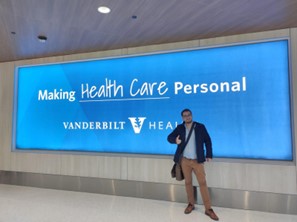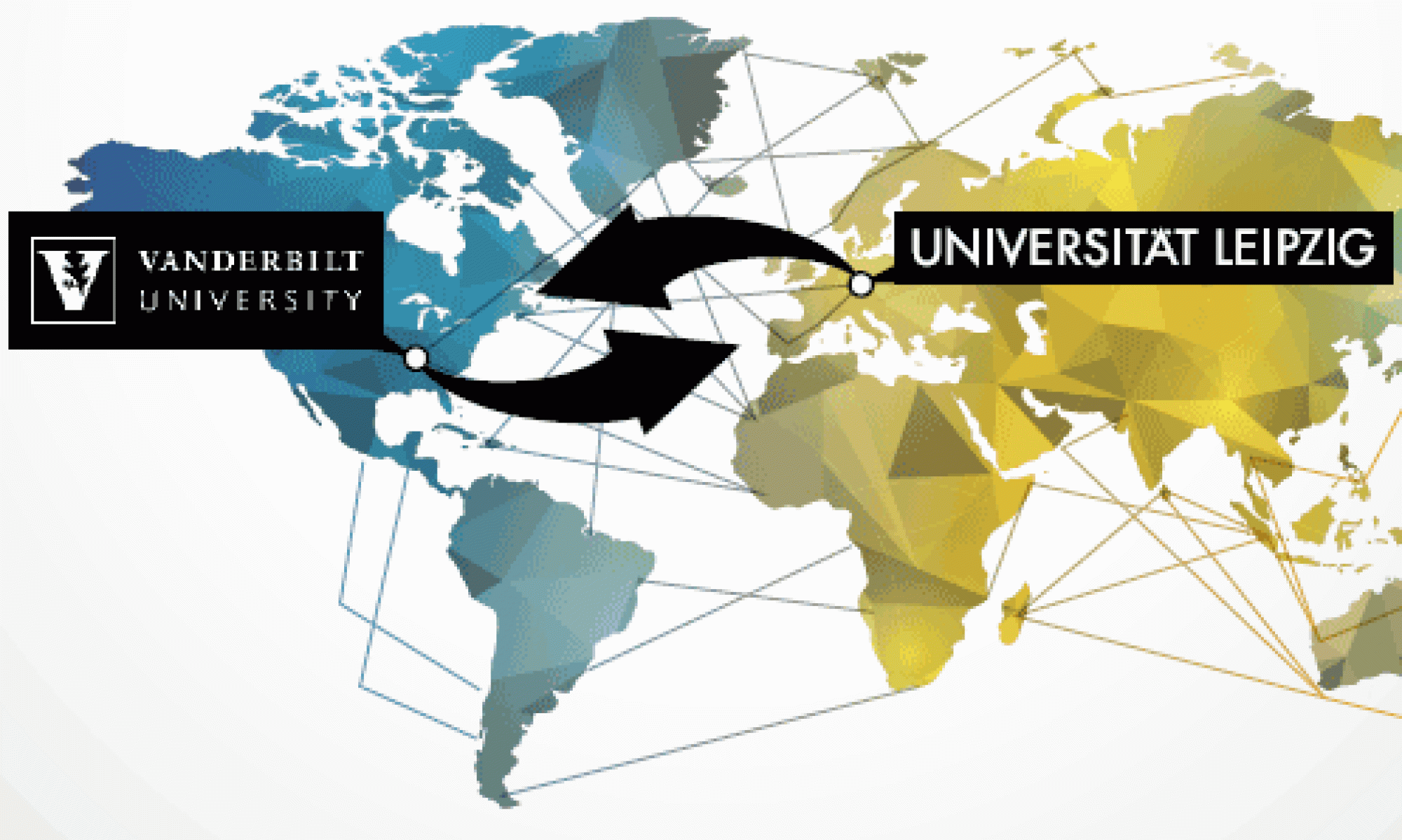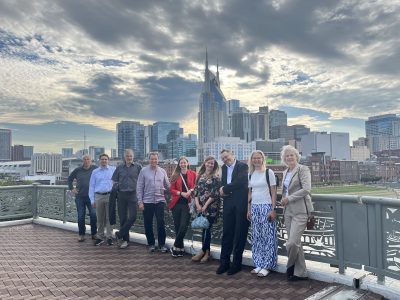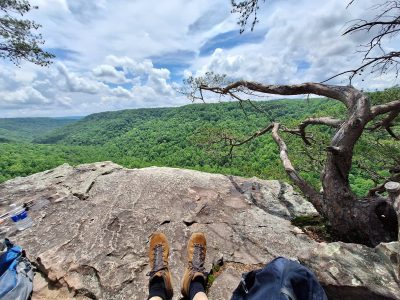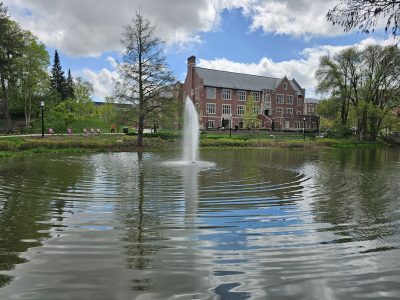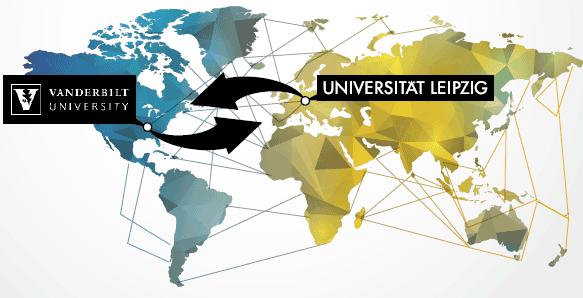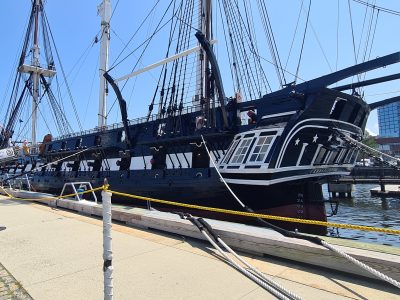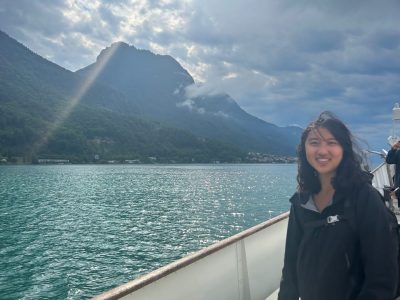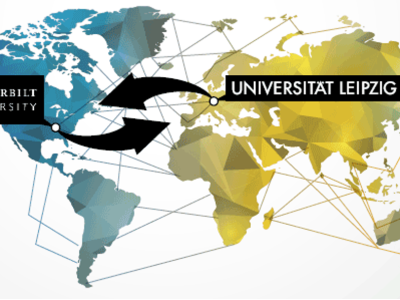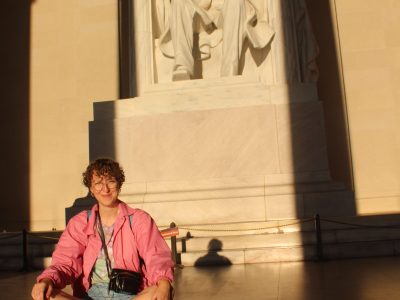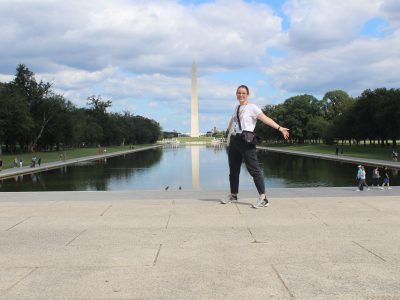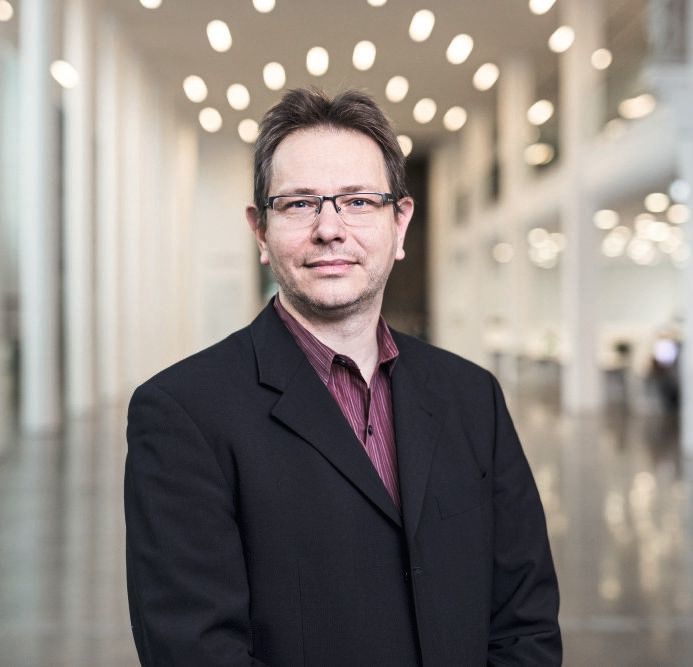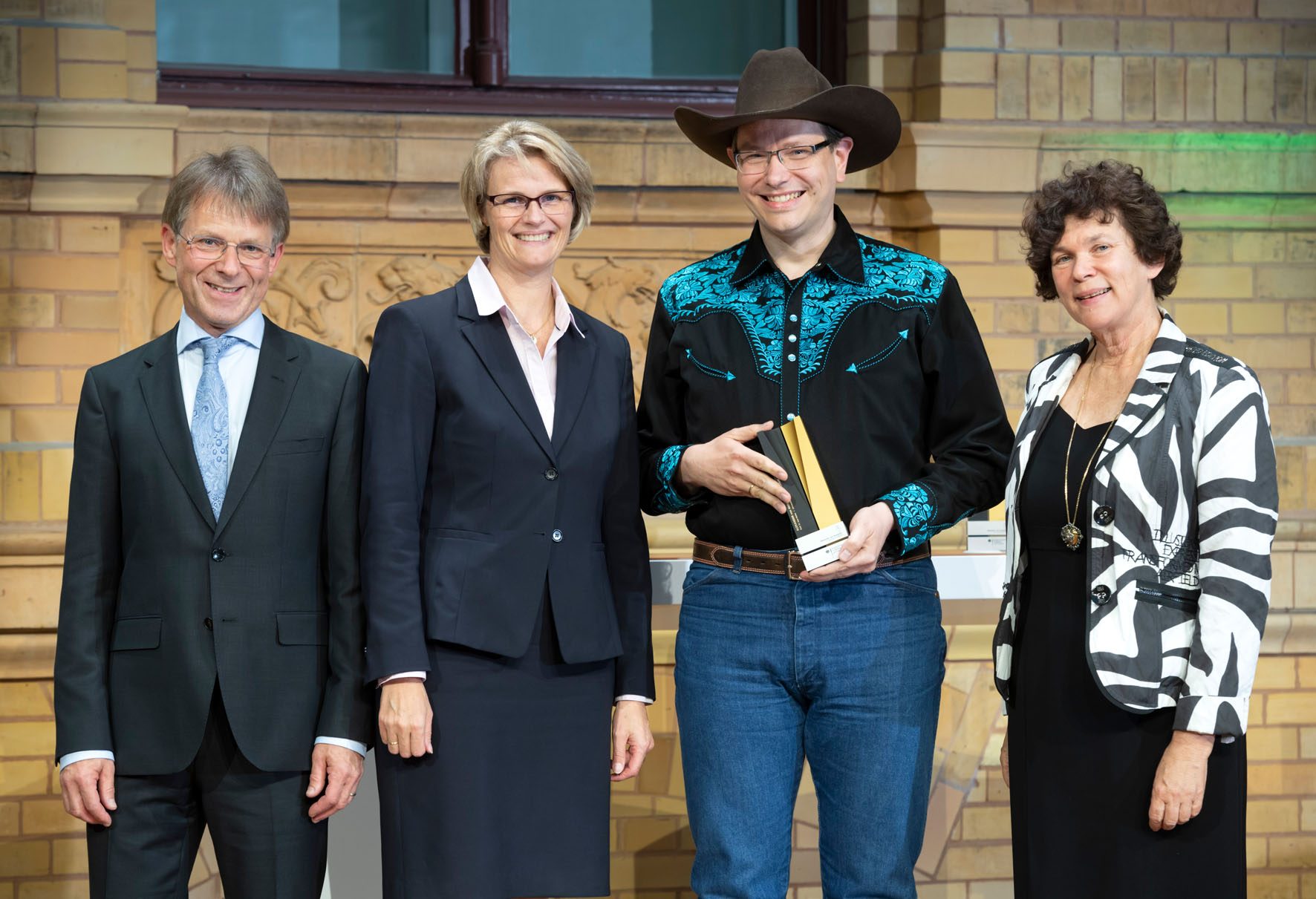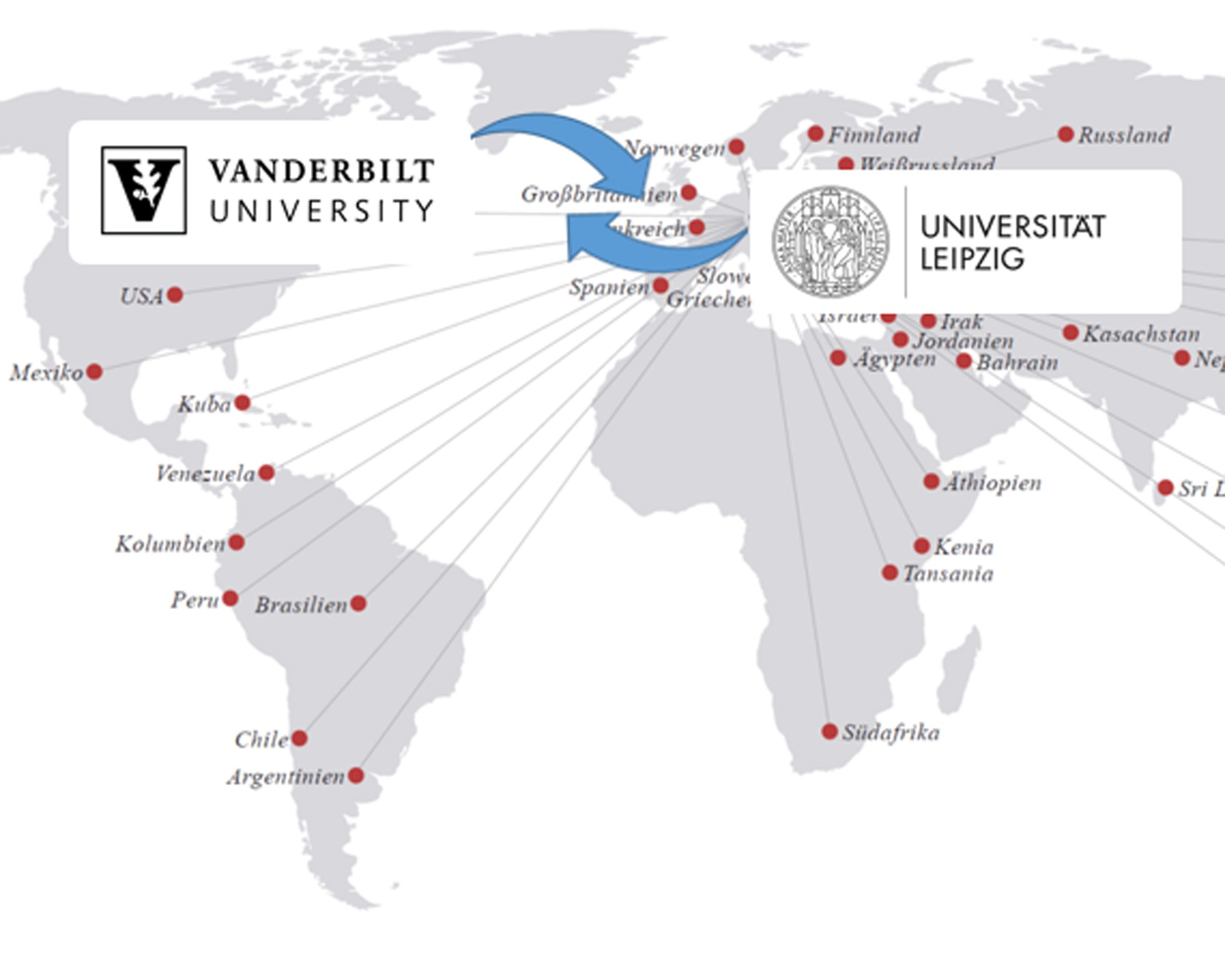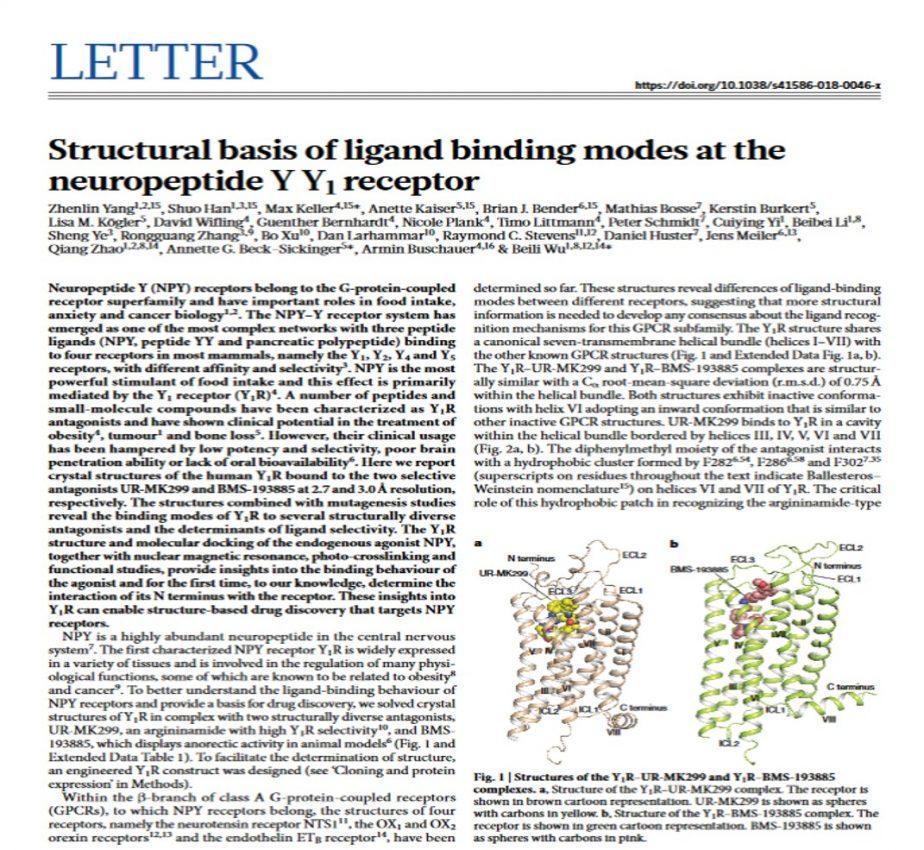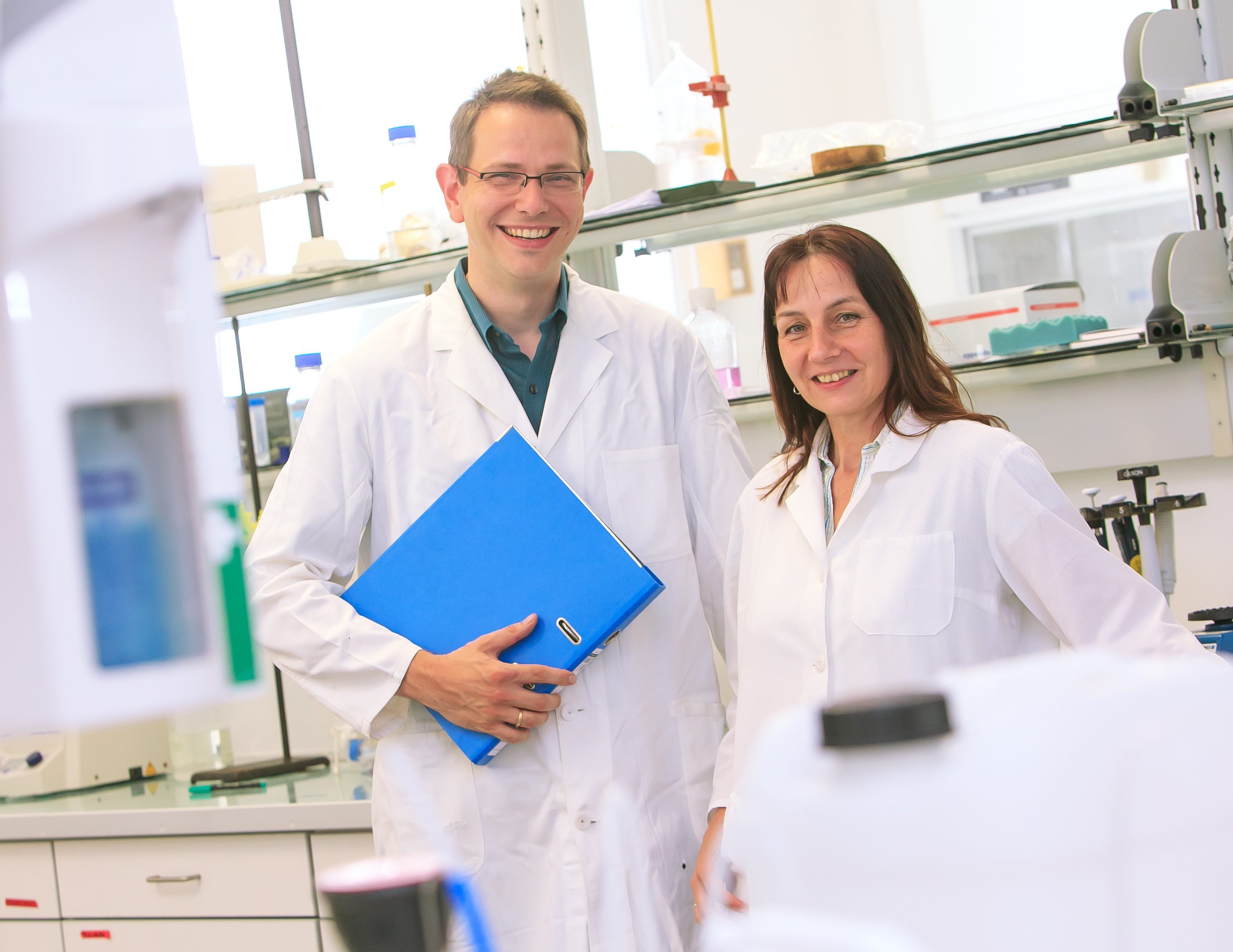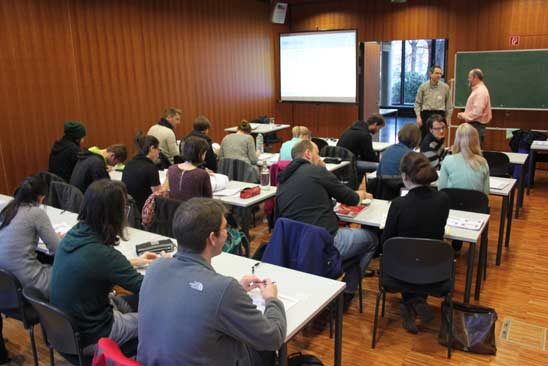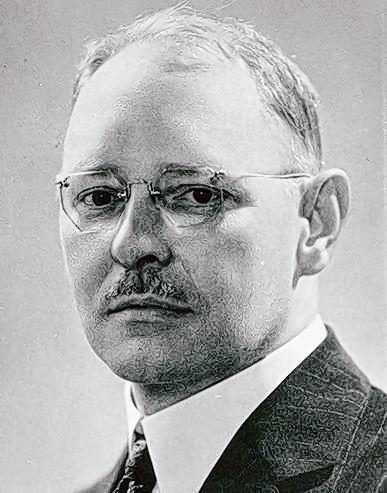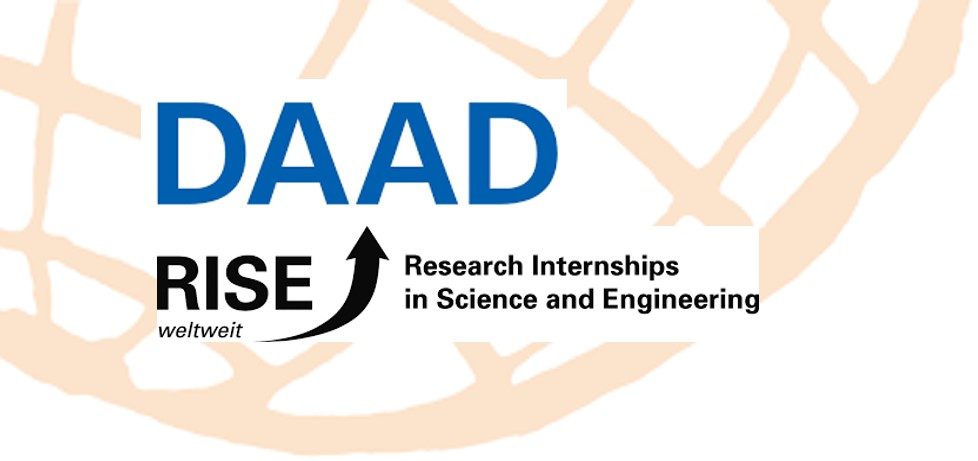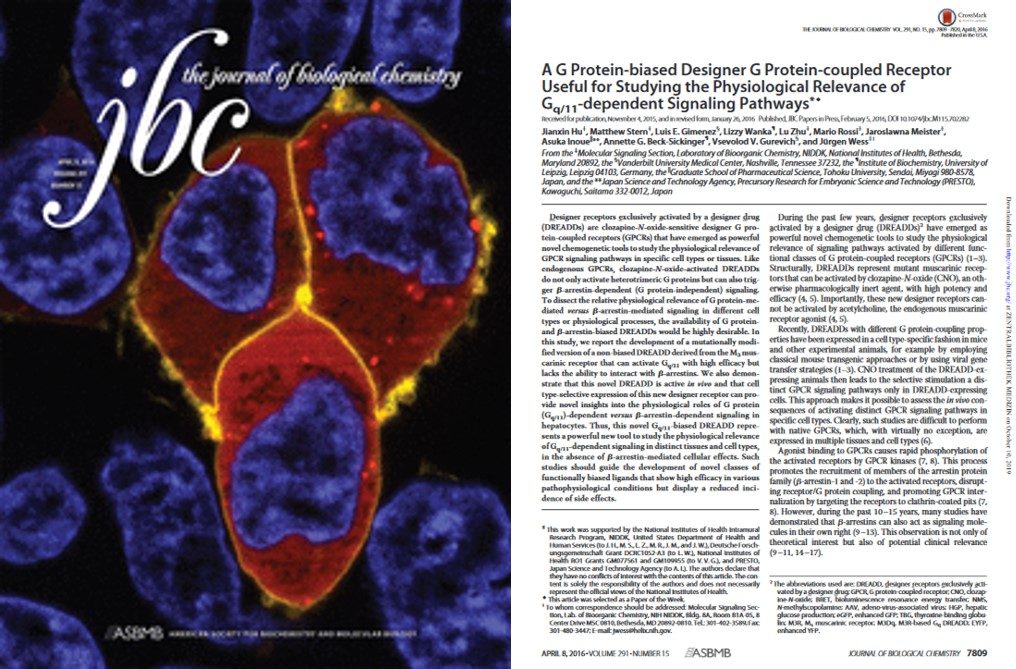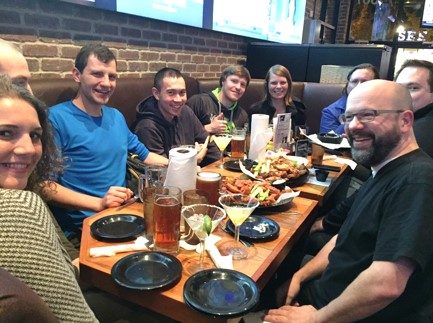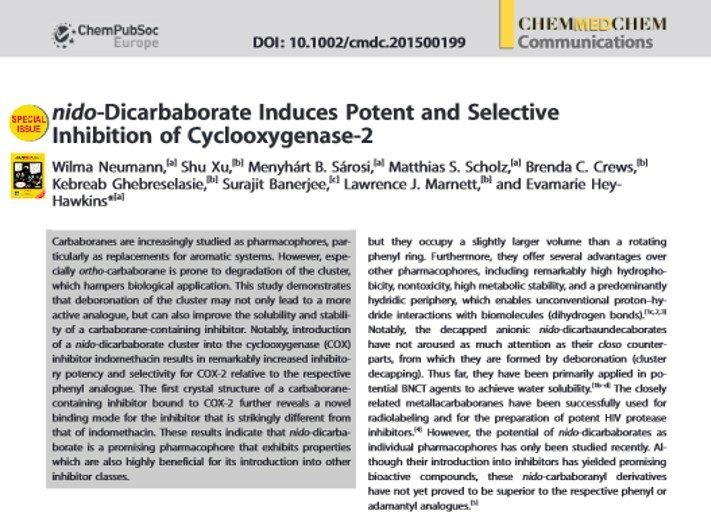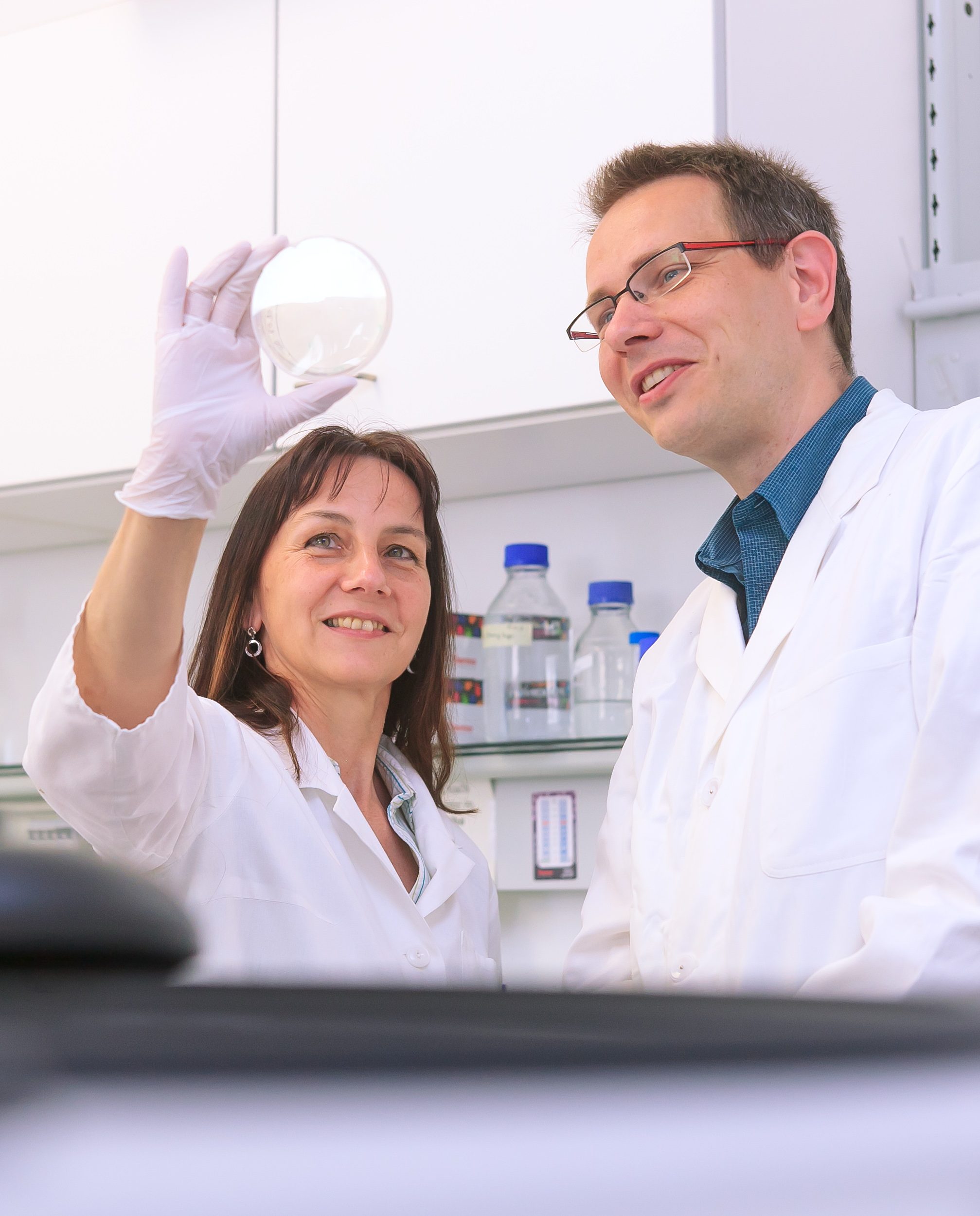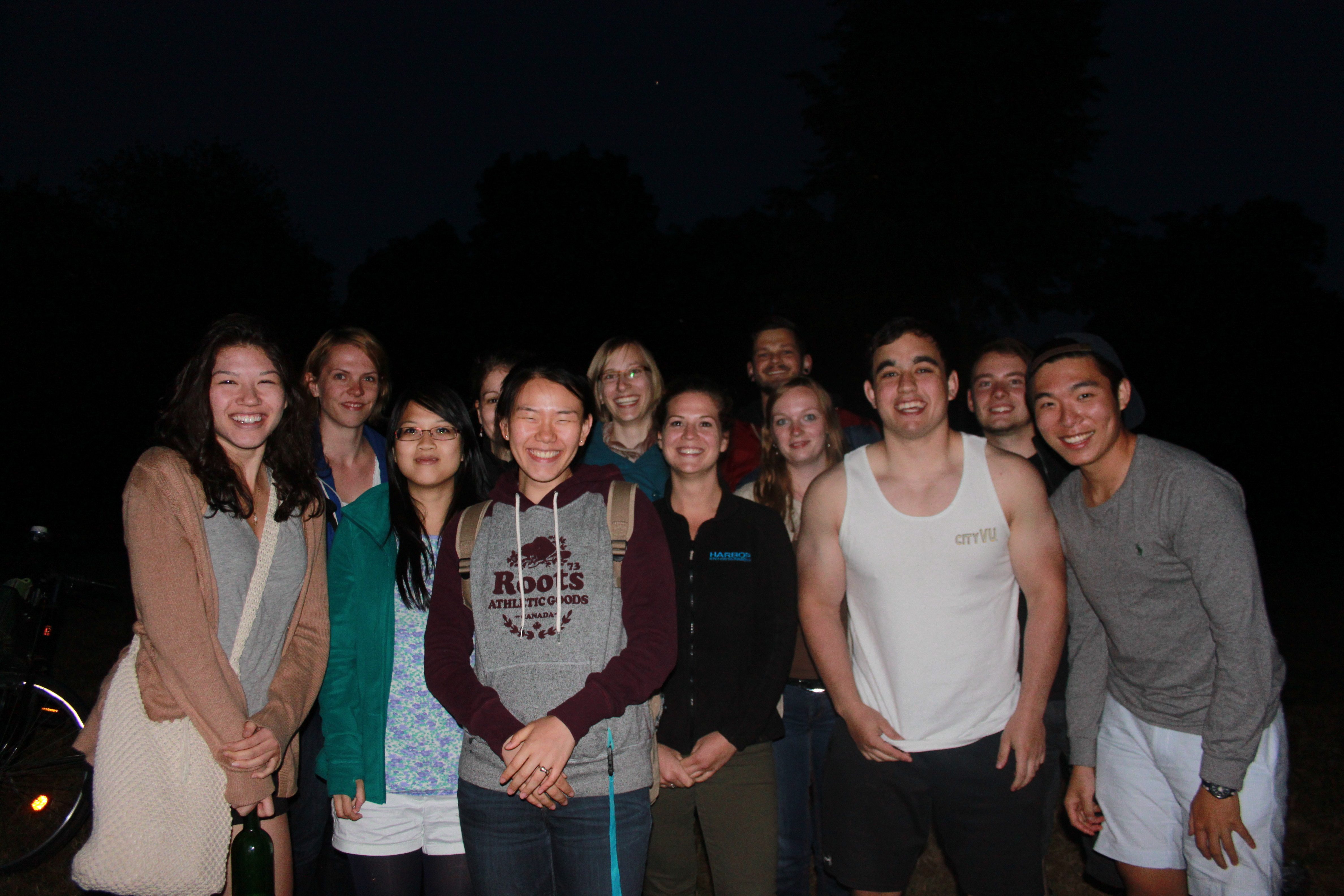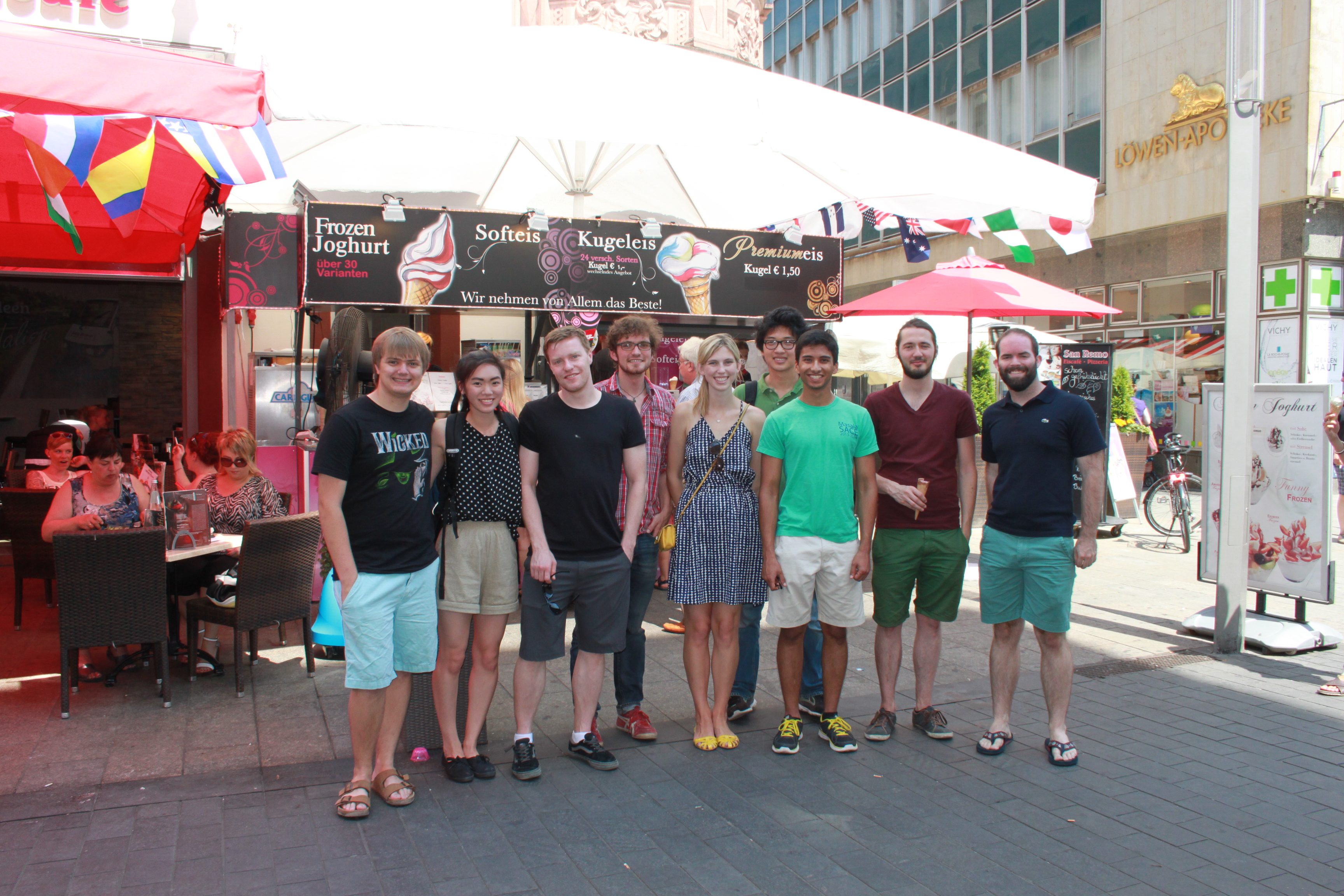This February, me and my soon-to be spouse had the incredible opportunity to live and learn new research methods in Nashville thanks to the Max-Kade Foundation. Nashville truly embodies its spirit as “Music City” with its vibrant country culture and southern charm and hospitality. Besides its cultural merits Nashville is also known for its cutting-edge biomedical education and research at Vanderbilt University and the adjacent Vanderbilt University Medical Center (VUMC). My research focuses on the interactions between magnetic resonance imaging (MRI) sequences and the underlying histopathology in oncological imaging. Using superior MRI techniques, we could better characterize tumors and guide clinical decision making. Coming from a background in radiology and clinical
The Institute for Drug Discovery, Leipzig University, together with Scads.AI and deNBI, invite you to participate in a week-long intensive workshop on methods in computational protein and drug design. This workshop, taking place in Leipzig from 14 to 18 July, 2025, is free of charge, and registration is now open! Please register until 6 June 2025. Information and registration: https://forms.gle/xnXNrmGq95JDhJdPA If you have any further question please contact Alex Zlobin ().
This February, my soon-to-be husband and I had the amazing chance to dive into new research adventures in none other than Nashville, Tennessee—all thanks to the incredible support of the Max Kade Foundation! Nashville isn’t just the “Music City” in name—it truly lives and breathes music, country vibes, and good old southern charm. But beyond the honky-tonks and cowboy boots, Nashville is also a serious hub for cutting-edge biomedical research, especially at Vanderbilt University and the world-renowned Vanderbilt University Medical Center (VUMC). It was the perfect mix of science and soul! My research dives into the fascinating link between chronic illnesses, like chronic kidney disease (CKD), and their effects on the
We cordially invite you to a talk by Dr. Cristina Elisa Martina, Vanderbilt University, on “Next generation vaccines for alphaviruses” on Tuesday, May 6th, at 10.30 a.m. in the small lecture hall at Bruederstr. 34. Cristina is a member and subgroup leader of the Meiler Lab in Nashville and leads the ARPA project on alphaviruses. Please forward this invitation to interested colleagues. Everybody is welcome to attend. We are looking forward to your participation. Link zu Vanderbilt Website: Meiler lab receives funding to advance vaccine research against alphaviruses (Posted by daviskd2 on Friday, October 11, 2024 in News.) https://www.vanderbilt.edu/csb/2024/10/11/meiler-lab-receives-funding-to-advance-vaccine-research-against-alphaviruses/
Influenza is a viral disease that results in the deaths of 650,000 people on a global scale every year. Immunocompromised populations are the most vulnerable to influenza infections, but treatment with therapeutic antibodies can improve patient outcomes. To this end, I have been attempting to redesign H7-200, a therapeutic antibody that only binds and protects against H7, towards the H3 subtype of influenza hemagglutinin. The binding site of H7-200, called the TI-II, is unique to H7 has not yet been documented with any other known subtypes. Thus, finding a TI-II-specific antibody that binds H3 would enable the development of more robust antibody cocktails for influenza treatments. My previous attempts to redesign
At the end of 2024, a delegation from Leipzig University visited Vanderbilt University in Nashville, Tennessee, to extend the cooperation agreement between the two universities and expand it to other faculties and research centers. In return, Leipzig University welcomed a delegation from Vanderbilt University, which also stopped off at ScaDS.AI Dresden/Leipzig for cooperation talks and a tour of our Living Lab on 10.02.2025. In addition to Jon Shaw, Director of Vanderbilt University’s Jean and Alexander Heard Libraries, which include nine campus libraries and several research facilities such as the Digital Lab, the Digital Archive of Slave Societies and the Vanderbilt Television News Archive, we were able to welcome Moritz Hagen Waschbüsch,
Predicting protein structures is a cornerstone of computational biology, with significant implications for drug discovery and bioengineering. AlphaFold has revolutionized this field, achieving near-experimental accuracy in structure prediction. However, its ability to generate conformational ensembles—critical for understanding protein flexibility—remains limited. This challenge arises because AlphaFold is essentially a black-box model, making it difficult to extract insights about alternative protein conformations. Sparse autoencoders (SAEs) have shown promise in interpreting and steering outputs of deep learning models, especially in large language models. Applying SAE techniques to AlphaFold could enhance its ability to generate diverse structural ensembles, providing deeper insights into protein dynamics and function. Over the summer, I explored methods to encourage AlphaFold
Unique Opportunities in Gaining Research Experience in Germany and USA The Max Kade Foundation (MKF, www.maxkadefoundation.org) supports an international research exchange between Vanderbilt and Leipzig Universities. Specifically, MKF provides funds of three undergraduate students from each university to conduct a 10 week summer internship at the respective partner university in 2025 (January – December). The Max Kade Foundation Scholarship Program is open for highly motivated and excellent foreign applicants with a BSc, MSc or equivalent degrees (obtained during the past year). Internship offer in Leipzig for Undergraduate Students from Vanderbilt University in the labs of: Dr. Georg Künze (Institute for Drug Development) Prof. Dr. Hildebrand / Dr. Vogel (Institute of Biophysics)
The partner universities Leipzig and Vanderbilt in Nashville, Tennessee (US) intend to continue their close cooperation until 2030. During a visit to Nashville by a delegation from Leipzig University led by Rector Professor Eva Inés Obergfell and Vice-Rector for Campus Development: Cooperation and Internationalisation, Professor Matthias Middell, the two sides signed a joint collaboration agreement on Tuesday evening (20 August, local time), extending their 15-year relationship for a further six years. The aim is to further develop cooperation in research, teaching, and knowledge and technology transfer and to focus on the joint promotion of early career researchers. At a ceremony in the Vanderbilt Tower in Nashville, the ten-member delegation from Leipzig
This spring, I had the incredible opportunity to live and work in Nashville for a few months, thanks to the Max-Kade Foundation. Nashville truly embodies its spirit as “Music City” with its vibrant country culture and southern charm. Beyond the exceptional honky-tonks, Nashville is also known for its cutting-edge biomedical education and research at Vanderbilt University (VU) and the adjacent Vanderbilt University Medical Center (VUMC). My research focuses on targeted therapeutics to treat diseases more precisely and effectively. Using specific peptide ligands, these drugs target disease-relevant cells while leaving healthy cells unaffected. Coming from a background in biochemistry, it was enlightening to collaborate with Prof. Ray Harris’s lab at VUMC, allowing
I knew my first trip to the US would be memorable, but I never imagined it would be this amazing. From the bustling streets of downtown Nashville to the serene lakeside at Hamilton Creek, the city is a sight to behold. Even more impressive was the cutting-edge research at Vanderbilt University (VU). As a junior scientist, it was thrilling to work with experts across various fields and deepen my understanding of pharmacodynamics in molecular biology. My PhD research focuses on the regulation of the NLRP3 inflammasome by PAR4. To address this, I aimed to learn techniques for proximal G protein signaling at the Hamm Lab at VU. Under the guidance of
Unique Opportunities in Gaining Research Experience in Germany and USA The Max Kade Foundation (MKF, www.maxkadefoundation.org) supports an international research exchange between Vanderbilt and Leipzig Universities. Specifically, MKF provides funds of three undergraduate students from each university to conduct a 10 week summer internship at the respective partner university in 2025 (January – December). The Max Kade Foundation Scholarship Program is open for highly motivated and excellent foreign applicants with a BSc, MSc or equivalent degrees (obtained during the past year). Internship offer in Leipzig for Undergraduate Students from Vanderbilt University in the labs of: Dr. Georg Künze (Institute for Drug Development) Prof. Dr. Hildebrand / Dr. Vogel (Institute of Biophysics)
The Max Kade Foundation (MKF, www.maxkadefoundation.org) supports an international research exchange between Vanderbilt and Leipzig Universities. Specifically, MKF provides funds of three‐four undergraduate students from each university to conduct a 10 week summer internship at the respective partner university. Travel costs and a weekly stipend are provided. They target rising junior and rising senior students at Vanderbilt University. To select the recipients of the stipend, we collect research project descriptions from around twenty core laboratories that support the collaboration between Vanderbilt and Leipzig Universities. Descriptions are provided by the graduate student or post‐doctoral mentor who will advise the undergraduate student. It is encouraged that the undergraduate student conducts research on the
It was the first time for me in the US and I had a lot of scientific and cultural experiences. Nashville is a vibrant city and definitely earns its name as “Music City”. Bars, live music, sports events… it does not get boring. Besides that, Nashville is a growing place for cutting-edge biomedical research. Vanderbilt University (VU) hosts many groups working in this field and is nation-wide known for its research. For me as a young scientist, it was an invaluable experience to get insight into this institution. The aim of my Ph.D. project is the discovery of small molecule inhibitors against the Ovarian Tumor (OTU) Protease of the Crimean-Congo Hemorrhagic
This summer, I had the incredible opportunity to travel to Nashville as part of my PhD project, collaborating with local scientists. Additionally, my internship coincided with attending the RosettaCon conference in Seattle, renowned for being one of the finest computational structural biology conferences. It boasted a multitude of captivating talks and provided a valuable chance to connect with fellow researchers. This trip also allowed me to participate in Meiler’s Lab retreat held in the breathtaking Great Smoky Mountains. My PhD research focuses on peptides, specifically designing therapeutic candidates using non-canonical amino acids. In Nashville, my primary goal was to explore the capabilities of existing software for designing peptides based on non-canonical
During my stay in Leipzig, I worked under Felipe Engleberger to explore the potential for Large Language Models (LLMs) to answer scientific questions. Knowing that LLMs have created such an impact on everyday life through technologies such as ChatGPT, I was excited to contribute towards expanding their function to fulfill scientific tasks, yet like all research questions, executing is much easier said than done. To begin this endeavor, we focused on a specific task–exploring if we could empower a chat agent to find mutations to optimize the thermal stability of a protein, a common question in protein design. I was pretty new to the field of artificial intelligence; thus, I started
BackgroundA previous postdoctoral research, in the Meiler Lab with 8 years of experience researching cholesterol interactions with membrane proteins. Research SummaryCholesterol is one of the most studied lipids as it relates to protein-lipid interactions. Cholesterol plays multiple biological roles in bile acid synthesis, steroidogenesis, and membrane dynamic function. Increasingly, evidence has shown that cholesterol also acts as a direct binder to IMPs, including G-protein coupled receptors (GPCRs). GPCRs are a protein superfamily containing seven transmembrane helices that are responsible for a wide variety of signaling responses. The seven helices form a hydrophobic pocket accessible from the extracellular side, forming the orthosteric pocket for endogenous ligands to bind to. The binding of
Through our long-standing partnership with the Max Kade Foundation, a short course titled “Current Developments in Experimental and Computational Engineering of Peptide Therapeutics” is being offered at Vanderbilt University this winter. It will be taught in person from February 27th through March 3rd at the times noted below. Faculty from Leipzig and Vanderbilt Universities will teach the course in lecture and computational laboratory settings. The course is open to faculty, staff, post-docs, and students and Vanderbilt and Leipzig Universities. This is non-credit, and enrollment is completed by emailing Carie Fortenberry at . Enrollment is limited due to lab space, and it is first come, first served. Course Description: Peptides as therapeutics
Dear colleagues, we want to bring your attention to an announcement the chancellor and provost made earlier this week: Vanderbilt has launched a new Global Scholars in Residence program, which provides funding to faculty who wish to bring accomplished international scholars to campus to contribute to our intellectual community. I encourage you to take advantage of this opportunity. We are, fortunately, in a position now where travel restrictions have lifted and we can once again collaborate with colleagues abroad. The exchange of ideas across borders, disciplines, perspectives, and cultures is valuable to faculty and students alike, expanding our understanding and strengthening our research and discovery. Details about how to apply are
Early in 2020 I started my Master Thesis by developing an evolutionary algorithm to optimize small molecules binding to protein targets of pharmaceutical interest. It was planned to start the project at Vanderbilt University in close cooperation with Rocco Moretti, the leading developer of small molecule code in the Rosetta Software suite. He is Assistant Professor in Jens Meilers group at VU. Unfortunately, the Covid pandemic struck, and the trip was canceled. This year, however, I got awarded another opportunity to travel to Vanderbilt for 8 weeks, now a PhD student and the initial project close to being published. Working closely together with Rocco Moretti and other Meiler lab scientist I
My time in the US was full of new experiences both scientifically and culturally. It already started off with a bang when beginning of August I was able to join the Summer RosettaCon near Seattle. My first in-person contact with the Rosetta Commons did not only bring exciting new perspectives on protein design and structure prediction from the top researchers of the field, but also invaluable first hand input on my projects during the poster sessions. Fast forward and halfway through this vast country I started my own research in Nashville. With Vanderbilt University hosting an excellent biomolecular NMR (nuclear magnetic resonance) facility, I planned to express and purify a Marburg
This summer I had the opportunity to travel to Nashville on a Max-Kade Fellowship to participate in a joined research project between Vanderbilt University, the Vanderbilt Medical Center and Leipzig University. I was fortunate that my stay corresponded with the Summer RosettaCon 22 in the sleeping lady resort in Washington state. This gave me the opportunity to meet other structural biology enthusiasts in my first in person conference since the Covid pandemic and explore Seattle and the surrounding area. Luckily also the Meilerlab retreat gave me the opportunity to go to Florida and get to know my fellow lab members at Vanderbilt. At Vanderbilt I tried to learn as much about
The Max Kade Foundation (MKF, www.maxkadefoundation.org) supports an international research exchange between Vanderbilt and Leipzig Universities. Specifically, MKF provides funds of three‐four undergraduate students from each university to conduct a 10 week summer internship at the respective partner university. Travel costs and a weekly stipend are provided. They target rising junior and rising senior students at Vanderbilt University. To select the recipients of the stipend, we collect research project descriptions from around twenty core laboratories that support the collaboration between Vanderbilt and Leipzig Universities. Descriptions are provided by the graduate student or post‐doctoral mentor who will advise the undergraduate student. It is encouraged that the undergraduate student conducts research on the
Unique Opportunities in Gaining Research Experience in Germany and USA The Max Kade Foundation (MKF, www.maxkadefoundation.org) supports an international research exchange between Vanderbilt and Leipzig Universities. Specifically, MKF provides funds of three undergraduate students from each university to conduct a 10 week summer internship at the respective partner university in 2019 (May – December). The Max Kade Foundation Scholarship Program is open for highly motivated and excellent foreign applicants with a BSc, MSc or equivalent degrees (obtained during the past year). Internship offer in Leipzig for Undergraduate Students from Vanderbilt University Evolutionary Guided Design of Novel PET-Degrading Enzymes to increase Thermostability Dr. Georg Künze (Institute for Drug Development) Analysis of Ternary
The Max Kade Foundation (MKF, www.maxkadefoundation.org) supports an international research exchange between Vanderbilt and Leipzig Universities. Specifically, MKF provides funds of three‐four undergraduate students from each university to conduct a 10 week summer internship at the respective partner university. Travel costs and a weekly stipend are provided. They target rising junior and rising senior students at Vanderbilt University. To select the recipients of the stipend, we collect research project descriptions from around twenty core laboratories that support the collaboration between Vanderbilt and Leipzig Universities. Descriptions are provided by the graduate student or post‐doctoral mentor who will advise the undergraduate student. It is encouraged that the undergraduate student conducts research on the
[article written by Peggy Darius Leipzig University] The COVID 19 pandemic poses a major threat to global health and currently there is little medical response. In addition, there is a lack of a profound understanding of the molecular mechanisms of the body’s immune system. An international team has now succeeded in scientifically describing highly active neutralizing human antibodies against the corona virus SARS-CoV-2. Humboldt Professor Jens Meiler of the University of Leipzig contributed to the study, which has now been published in the scientific journal “Nature”. Highly active neutralizing human antibodies against the coronavirus SARS-CoV-2 can be used for the development of vaccines and can also be used as therapy in
[article only in german language, article written by Dr. Katarina Werneburg Leipzig University / picture: Christian Hüller / Universität Leipzig, SUK] Alte Heimat und neue Herausforderung Was sind die Forschungsschwerpunkte unserer Professoren? Was ist ihnen in der Lehre wichtig, und haben unsere Experten eigentlich auch Hobbys oder ein Lebensmotto? Im LUMAG stellt sich auch heute wieder einer unserer neuberufenen Professoren vor. Diesmal ist es Jens Meiler vom neu gegründeten Institut für Wirkstoffentwicklung. Sein Fachgebiet ist die computergestützte Wirkstoffforschung. Herr Meiler, woher kommen Sie und was haben Sie studiert? Ich bin in Leipzig geboren und aufgewachsen. Nach meinem Abitur am Wilhelm-Ostwald Gymnasium studierte ich Chemie an der Universität Leipzig. Was waren Ihre
[Press Release 25/11/2019, Leipzig University 234/2019 by Carsten Heckmann / Photo: Leipzig University, Swen Reichhold] Further boost for top-level research at Leipzig University: New Collaborative Research Centre gets go-ahead and two more are extended. The University’s new Collaborative Research Centre (CRC), “Structural Dynamics of GPCR Activation and Signal Transduction”, will focus on how cells communicate via important receptors. Its spokesperson will be Professor Annette G. Beck-Sickinger. Applications for a second funding period were also successful for the projects “Arctic Climate Change (AC)³” (spokesperson: Professor Manfred Wendisch, Leipzig Institute for Meteorology) and “Processes of Spatialization under the Global Condition” (spokesperson: Professor Matthias Middell, head of Leipzig University’s Centre for Area Studies). Brief
The Max Kade Foundation (MKF, www.maxkadefoundation.org) supports an international research exchange between Vanderbilt and Leipzig Universities. Specifically, MKF provides funds of three‐four undergraduate students from each university to conduct a 10 week summer internship at the respective partner university. Travel costs and a weekly stipend are provided. They target rising junior and rising senior students at Vanderbilt University. To select the recipients of the stipend, we collect research project descriptions from around twenty core laboratories that support the collaboration between Vanderbilt and Leipzig Universities. Descriptions are provided by the graduate student or post‐doctoral mentor who will advise the undergraduate student. It is encouraged that the undergraduate student conducts research on the
[article written by Dr. Katarina Werneburg Leipzig University / picture: Humboldt-Stiftung/Elbmotion] The Alexander von Humboldt Foundation awarded Prof. Dr. Jens Meiler the highly endowed Alexander von Humboldt Professorship. The 44-year-old is one of the world’s most distinguished researchers in the field of computer-aided drug discovery. The Alexander von Humboldt Professorship is Germany’s most valuable research prize. “I am delighted that the long-standing research partnership between Leipzig University and Vanderbilt University has now culminated in Jens Meiler’s Humboldt Professorship. This will unlock new horizons for Professor Beck-Sickinger’s already highly successful area of research into molecular mechanisms. It will also considerably strengthen our degree program in Pharmacy at the Faculty of Medicine,” commented
Unique Opportunities in Gaining Research Experience in Germany and USA The Max Kade Foundation (MKF, www.maxkadefoundation.org) supports an international research exchange between Vanderbilt and Leipzig Universities. Specifically, MKF provides funds of three undergraduate students from each university to conduct a 10 week summer internship at the respective partner university in 2019 (May – December). The Max Kade Foundation Scholarship Program is open for highly motivated and excellent foreign applicants with a BSc, MSc or equivalent degrees (obtained during the past year). Internship offer in Leipzig for Undergraduate Students from Vanderbilt University Analysis of Ternary Complexes of G-Protein Coupled Receptors Using Molecular Dynamics Simulations. Prof. Dr. Hildebrand/Dr. Vogel (Institute of Biophysics) Structural
(30/04/2018 by Anett Albrecht): A joint publication of Leipzig and Vanderbilt scientists was published in April 2018 in the prestigious journal “Nature”. The article continues the series of numerous publications that have emerged already from the long-term collaboration between the Leipzig and Vanderbilt University. Abstract: Neuropeptide Y (NPY) receptors belong to the G-protein-coupled receptor superfamily and have important roles in food intake, anxiety and cancer biology 1,2 . The NPY-Y receptor system has emerged as one of the most complex networks with three peptide ligands (NPY, peptide YY and pancreatic polypeptide) binding to four receptors in most mammals, namely the Y1, Y2, Y4 and Y5 receptors, with different affinity and selectivity 3
[press release written by Susann Huster/Anett Albrecht, April 10, 2018] The cooperation between the University of Leipzig and Vanderbilt in Nashville (USA) has been contractually sealed for another ten years. A few days ago, the rectors of both universities signed a Memorandum of Understanding. The American Max Kade Foundation had previously approved an application for funding from project leaders Prof. Dr. Annette Beck-Sickinger from the Institute of Biochemistry at the Leipzig University and Prof. Dr. Jens Meiler from Vanderbilt University: The foundation will also support the exchange with 50,000 dollars (40,000 euros) per year between 2017 and 2021. “We hope that the already established excellent relations with Vanderbilt University will continue
The Max Kade Foundation (MKF, www.maxkadefoundation.org) supports an international research exchange between Vanderbilt and Leipzig Universities. Specifically, MKF provides funds of three undergraduate students from each university to conduct a 10 week summer internship at the respective partner university in 2018 (May – September). The Max Kade Foundation Scholarship Program is open for highly motivated and excellent foreign applicants with a BSc, MSc or equivalent degrees (obtained during the past year). Identification of functional protein-protein-interactions of the ecto- and endodomain of adhesion G protein-coupled receptors (Prof. Dr. Vsevolod Gurevich) Investigation of Ligand Binding at the Chemokine-Like Receptor 1 (Prof. Dr. Jens Meiler) Rosetta docking of allosteric modulators to the Y4 receptor.
Biochemical Colloquium – Special Topics in Biochemistry: Prof. Dr. Jens Meiler, Center for Structural Biology, Departments of Chemistry, Pharmacology, and Biomedical Informatics, Vanderbilt University, Nashville Tenessee Date October 24, 2017 / 5 PM Venue Leipzig University, ITP – Institute for Theoretical Physics, Lecture Hall, Linnéstraße 5, 04103 Leipzig, Germany. Backround The protein folding problem – i.e. predicting the three-dimensional structure of a protein from its amino acid sequence alone – is an unsolved problem in computational biology. I will present a novel computational approach to this problem that assembles protein tertiary structure from predicted secondary structure elements. I will demonstrate how this algorithm can be combined with limited EPR- and NMR-spectroscopic
The Center of Structural Biology (Vanderbilt University) and the Institute of Biochemistry (Leipzig University) has secured funds for an international fellowship program from the Max Kade Foundation for the period 2017 to 2021. The Max Kade Foundation takes pride in participating and sponsoring various programs which encourage the exchange of academic ideas among universities and colleges in the United States and in German-speaking countries (www.maxkadefoundation.org). The foundation recently awarded the Vanderbilt-Leipzig research exchange program a second grant to cover the travel and support of six undergraduate student exchanges, as well as two faculty exchanges per year. The students will travel to their respective university and join a research project under a
Unique Opportunities in Gaining Research Experience in Germany and USA The Max Kade Foundation (MKF, www.maxkadefoundation.org) supports an international research exchange between Vanderbilt and Leipzig Universities. Specifically, MKF provides funds of three undergraduate students from each university to conduct a 10 week summer internship at the respective partner university in 2017 (May – December). The Max Kade Foundation Scholarship Program is open for highly motivated and excellent foreign applicants with a BSc, MSc or equivalent degrees (obtained during the past year). Internship offer in Leipzig for Undergraduate Students from Vanderbilt University Investigation of allosteric modulation of the human Y4 receptor Prof. Dr. Annette Beck-sickinger / Mario Schubert (Institute of Biophysics) Preparation
The German Academic Exchange Service (Deutscher Akademischer Austauschdienst, DAAD) announced a new call for its program “Research Internships in Science and Engineering” (RISE) for summer internship in 2017. The program works in both ways. German and American Ph.D. students submit internship offers for undergraduates students for a duration of 8 to 12 weeks. German bachelor students can work as research interns at U.S. universities and U.S. undergraduates can work in labs of German universities. The DAAD provides stipends to help cover living expenses, the partner universities and research institutes provide housing assistance. The call is applicable for all fields of biology, chemistry, physics, earth sciences and engineering. Please visit for further
The joint publication of Hu, Stern, Gimenez, Wanka, Zhu, Rossi, Meister, Inoue, Beck-Sickinger, Gurevich and Wess was named as “Paper of the Week” by the Journal of Biological Chemistry’s editorial board, landing it in the top 2 percent of all papers published over the year in the journal. The joint publication focussed on designer receptors exclusively activated by a designer drug – short DREADDs. This are CNO sensitive designer G protein-coupled receptors which are able to activate heterotrimeric G proteins and also trigger arrestin-dependent signaling. In the present study the development of a mutationally modified version of a non-biased DREADD derived from the M3 muscarinic receptor that can activate Gq/11 with
During an internship in the lab of Dave Weaver at Vanderbilt University, I got the opportunity to gain more information about the Y4R, by testing a variety of similar structurally related compounds. I was introduced in the workflow of a high throughput screening laboratory. The technical equipment in the Vanderbilt HTS center makes it possible to test thousands of different chemical compounds in a very short time. Therefore, I learned to perform Ca2+-flux based signal transduction screening assays to monitor the activation of the Y4R. Using this system, I could test new hit compounds out of the ongoing screening for activity and selectivity. Furthermore, I tested structurally similar compounds of a
The objective of our visit was deepening the collaboration between Leipzig University and Vanderbilt University regarding the integration of limited experimental data into protein ensemble prediction. During this visit Axel Fischer presented a method to integrate cross-linking data into protein structure prediction methods at the 5th Symposium on Structural Proteomics in Halle. Following subsequent discussions with Dr. Stefan Kalkhof and Tommy Hofmann, work on an algorithm to efficiently simulate cross-link conformations was continued. In a preliminary study, the algorithm significantly improves the accuracy with which protein structures can be predicted. Additionally, Axel developed an algorithm to integrate solid-state nuclear magnetic resonance (ssNMR) data into the protein structure prediction software BCL::Fold. While
(Leipzig/Nashville, 02/03/2016): Scientists at Leipzig University and Vanderbilt University (USA) reduced the side effects of Indomethacin by altering the so-called boron cluster molecule of this drug. This molecule have a spherical shape – composed of boron, hydrogen and carbon atoms. The active ingredient causes an inhibition of the enzyme cyclooxygenase, which plays an important role in production of inflammations and pain. But Indomethacin also leads to severe side effects. The scientists changed the drug, so that it blocks only the pathological form of the enzyme. The other form, which controls important physiological processes in the body, would barely be affected. The results underline the potential of boron clusters in pharmacytical application
(by David Salisbury, Vanderbilt University): Associate Professor of Chemistry Jens Meiler has received a Friedrich Wilhelm Bessel Research Award from the Alexander von Humboldt Foundation in Bonn, Germany. The award is given to scholars based on their “outstanding research accomplishments and exceptional promise for the future.” Individuals are nominated by German scholars and must have received their Ph.D. in the last 18 years. In addition to a monetary prize, award winners are invited to spend a period of up to one year collaborating on a long-term research project. Meiler, who has an international reputation in the field of structural biology, will be collaborating with colleagues at Leipzig University on studies of
The Max Kade Foundation (MKF, www.maxkadefoundation.org) supports an international research exchange between Vanderbilt and Leipzig Universities. Specifically, MKF provides funds of three undergraduate students from each university to conduct a 10 week summer internship at the respective partner university in 2016 (May – September). The Max Kade Foundation Scholarship Program is open for highly motivated and excellent foreign applicants with a BSc, MSc or equivalent degrees (obtained during the past year). Internship offer in Leipzig for Undergraduate Students at Vanderbilt University (Date: May – August 2016) “Genetic Incorporation of Photocrosslinking Amino Acids: Binding Pattern of β-Arrestins on a Class B GPCR“ Laboratory Principal Investigator: Dr. Irene Coin Graduate Mentor in host
In 2015 eight students on Bachelor- or Master level got the Max-Kade Scholarship to participate in ongoing research projects between Vanderbilt University and the University of Leipzig. Hereby their short research and travel reports are listed… Ryan Xin (Undergraduate Student at Vanderbilt University): Semisynthetic Preparation of Ga Fusion Proteins to Investigate Receptor Interaction (Laboratory of Prof. Dr. Annette Beck-Sickinger & Stefan Ernicke / May-July 2015) In my time at Leipzig University, I learned a great deal from my mentor, Stefan Ernicke, and the rest of the laboratory. Before my internship with the Max Kade Foundation, I had never worked extensively in molecular biology. After my time with the Beck-Sickinger lab, I
by Gregory Sliwoski (doctoral student at Vanderbilt University): After completing my M.S. in pharmacology from Vanderbilt University under Prof. Dr. Jens Meiler in 2012, I joined Annette Beck-Sickinger’s lab at Leipzig University to further study the neuropeptide Y4 receptor (Y4R). This particular trip is my fourth stay in Leipzig in the collaboration between the labs of Prof. Dr. Jens Meiler (Vanderbilt) and Prof. Dr. Annette Beck-Sickinger (Leipzig). This collaboration combines computational modeling with cell-based signaling and mutategensis assays to characterize the activation of Y4R and discover new compounds that may enhance Y4R signaling. Signaling through this receptor has been shown to be a potential avenue for treatment of obesity and related
The Max Kade Foundation (MKF, www.maxkadefoundation.org) supports an international research exchange between Vanderbilt and Leipzig Universities. Specifically, MKF provides funds of three‐four undergraduate students from each university to conduct a 10 week summer internship at the respective partner university. Travel costs up to $2000 and a weekly stipend of $400 are provided. They target rising junior and rising senior students at Vanderbilt University. To select the recipients of the stipend, they collect research project descriptions from around twenty core laboratories that support the collaboration between Vanderbilt and Leipzig Universities. Descriptions are provided by the graduate student or post‐doctoral mentor who will advise the undergraduate student. It is encouraged that the undergraduate
by Carsten Heckmann (LUMAG, 01-2015, 03/12/2015): To name the cities of Leipzig and Nashville in a sentence, could comes up with the idea: it could go on music. Classic here – Country there. But this is no topic for this research report. There is also the research field biochemistry – with a remarkable partnership between both universities. To bridge 7,500 kilometer is not difficult for Prof. Dr. Annette Beck-Sickinger and Prof. Dr. Jens Meiler (Vanderbilt University). Sometimes they feel more like neighbors. “We work extremely well together,” says the Leipzig professor at the Institute of Biochemistry. More than 20 joint publications have appeared since 2008, emerged from around 30 joint projects.
by Peter Schmidt (postdoc at Leipzig University): GPCRs have been shown to play a crucial role in a variety of diseases, such as obesity, metabolic diseases and cancer. Accordingly, they are an attractive target for the investigation of new pharmaceuticals. Di-carba-closo-dodecaboranes(12) (closo-C2B12H12 or carbaboranes) were recently established as pharmacophores. Their unique properties (hydrophobicity, three-dimensional aromaticity, etc.) make them interesting targets for drug development. In this project, specific carbaborane derivatives will be prepared and used either as conjugates with peptides of the melanotropin (MSH) or neuropeptide Y (NPY) family, or as small molecules that impart their action via GPCRs to study and understand their influence on the selectivity and activity. NPY binds
2014 eight students on Bachelor- or Master level got the Max-Kade Scholarship to participate in ongoing research projects between Vanderbilt University and the University of Leipzig. Hereby there short research and travel reports:

